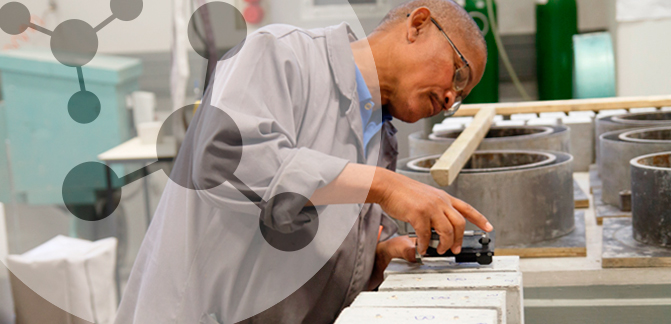
CoMSIRU's laboratories of the University of Cape Town consist of several units. We offer:
- Standard laboratory equipment for the testing of construction materials
- Specialized equipment for concrete materials testing
- Destructive and non-destructive structural testing of concrete elements

ISO 9001:2015 certified. View certificate
Concrete Materials and Structural Engineering Laboratory
The concrete and structural engineering laboratory is a key component of the concrete research at the University of Cape Town, Department of Civil Engineering. The laboratory allows staff and students to assess the various fresh and hardened concrete properties that may affect the performance of concrete structures. The laboratory is equipped with standard and specialized facilities for concrete manufacture, the testing of fresh and hardened concrete properties and the structural assessment of concrete elements.
Concrete mix design, specimen manufacture and curing facilities
- Concrete mix design development
- Batching and mixing facilities for cement slurries, mortar and concrete
- Fresh concrete properties evaluation (workability, flowability, heat of hydration)
- Concrete curing facilities (controlled environment rooms, water curing, steam curing facilities)
- Drying ovens, kilns
- Chamber for accelerated carbonation exposure
Concrete materials testing and assessment: Standard laboratory tests
- Compressive strength (cubes, cast cylinders or cores)
- Tensile strength (direct tensile strength, tensile split strength, flexural strength)
- Static modulus of elasticity
- Toughness of FRC beams
- Reinforcement bond testing
- Ultrasonic pulse velocity testing
- Creep
- Shrinkage
- Coefficient of thermal expansion
- Abrasion resistance
- Durability Index testing (oxygen permeability, water sorptivity, chloride conductivity)
- Bulk Diffusion testing
- Chloride content (chloride profiling)
- Carbonation depth testing
- Penetrating corrosion inhibitor tests
- Alkali silica reactivity
- Hydration heat development
- Interface shear bond strength
- Coarse and fine aggregate testing
- Microscopy and petrographic investigations
Structural assessment: Standard in-situ tests
- Assessment of damaged or cracked concrete structures
- Assessment of corrosion damage
- Corrosion rate measurements
- Rebar potential mapping
- Cover depth measurements
- Ultrasonic pulse velocity testing
Structural testing
- Flexural behaviour of concrete beams and slabs
- Load-bearing capacity of FRP-strengthened concrete elements
Structural Health Monitoring and Structural Integrity Laboratory
The following equipment and software are available:
- 16 Channel simultaneous sampling dynamic data acquisition system
- 6 QA700 Honeywell accelerometers
- 3 PCB seismic accelerometers
- APS dynamics, long stroke shaker
- 12bl impulse hammer
- National instruments data acquisition software (signal express)
- Modal analysis software
- Modal, a Matlab based software developed by Prof. J.M.W Brownjohn
- MEScope
